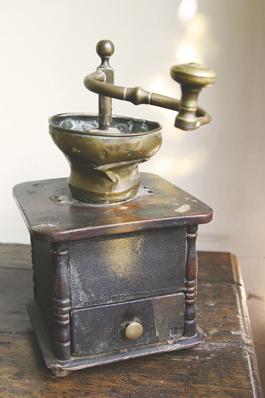home | north bay bohemian index | sonoma, napa, marin county restaurants | review

FORMER GRIND: Different roasting techniques are quickly making French roast as passť as this 'machine.'
Coffee Futures
Like fine wine, fine grinds are becoming more technical, more devoted to terroir and a whole lot lighter
By Denis Lindsay
French roast. Dark roast. Burnt. Smoky. Charcoal. White mocha. Venti latte. Extra caramel macchiato.
What the hell happened to the coffee?
In an industry dominated by sugary sweet drinks, small cafes and roasters have taken their love of coffee back to the basics. Starting with carefully selected coffee crops, various roasters now spend countless hours formulating the perfect roast for their beans. In order to best display all the characteristics of a bean, more roasters find themselves roasting lighter, a huge departure from the extra-dark French roast that still dominates the coffee world.
The French method of roasting, the darkest on the spectrum, started in Southern France with the discovery that double roasting eliminated all the negative characteristics in even the poorest grade coffee. This allowed for a more palatable, smoky-charcoal flavor present in all French roast coffees today. But all that's beginning to change.
Beyond the roast, cafes now use more effective brewing techniques to showcase all the complexities of a coffee within a single cup, primarily with a French press, which does not use a paper filter. Without the filter, the oils and flavors stay intact, leaving a richer, more balanced, paper-free taste.
This simple yet effective brewing technique remains the closest process to a professional coffee "cupping." At a cupping, hot water is poured over coarse grounds. After the grounds form a crust, the taster breaks the crusts, smells the aroma and sifts the crust off with a spoon. The taster then slurps the coffee in spoonfuls, getting a complete, unfiltered appreciation of the coffee and all its characteristics.
The French press only deviates from this method with its metal-mesh filter. Small amounts of sediment do reach the cup with this brew method, but that remains its only downfall. Glass French presses work well for personal use, but the insulation and durability of the stainless steel Bodum press makes it adored by cafes and coffee lovers.
The Clover, used by Ritual Roasters and found in select Starbucks, is an $11,000 machine that brews cups of coffee individually. This high-tech, paper-free method takes a small amount of grounds, variable to the type of coffee, and uses hot water and vacuum power to essentially create a French press brew, without any sediment or mess. The brew time adjusts to the type of bean as well, allowing the user the control to brew a perfect cup.
While Local 123 in Berkeley still uses paper filters, owners Katy Wafle and Frieda Hoffman have set a new standard in freshness and choice. Customers have the option of four different single-origin coffees. Upon order, the coffee of choice brews before the customer. This creates an intimate, interactive and conversational process Wafle and Hoffman call a "pour-over."
During the pour-over, a precise amount of coffee is freshly ground into a paper cone, and the cone is placed above a cup. Hot water is poured through the filter and into the cup before the customer's eyes. "It gives us an opportunity to engage the customer and take them from fragrance to aroma, and have them experience the coffee," Wafle explains. Since each cup of coffee is made to order, virtually no waste is created. Wafle and Hoffman have also eliminated syrups and sweeteners from their cafe, which prevents customers from hiding their coffee behind sugar.
Cafe Noto in Windsor does something very similar called a Brew Bar. Just like Local 123, they offer options of single-origin coffees as well as blends, which they brew through unbleached paper filters upon order. "It gives more antioxidants," manager Jen Leytem explains. These filters still absorb some oils and in turn some flavor but prevent more of the papery taste found in bleached filtration.
Of course, the brewing system also relies on the coffees it brews. Roasters are now choosing beans more selectively. As opposed to buying a variety of beans within a country, roasters seek out specific crops within countries for their individual characteristics, just like terroir informs wine. The term "single-origin farm" is being used to speak to a crop's uniqueness.
For example, a Panamanian coffee crop from the Elida Estate holds notes of lemon, verbena and green apple, while a Panamanian crop from the Don Pepe Farm reveals notes of cocoa and plum. Instead of associating a crop with its country of origin, growers and roasters have become very specific to farm and sometimes the particular lot within a farm; microclimates within a farm have a huge impact on the variation of flavor and characteristics in a coffee.
Though the convenience of Starbucks and Peet's cannot be replicated by a small, high-quality, sustainable cafes, there are some alternatives worth exploring in the North Bay. Here exist complex coffees that can stand alone without sugar, vanilla, cream and cocoa. The future of coffee looks a little lighter and a little brighter.
Hot Stuff
Cafe Noto (single cup brew, single-origin coffee) 630 McClelland Drive, Windsor; 707.836.1830. www.cafenoto.com.
Flying Goat Coffee (French press, light roast coffee, single origin whole bean and espresso) 324 Center St., Healdsburg; 707.433.3599. 419 Center St., Healdsburg; 707.433.8003. 10 Fourth St., Santa Rosa; 707.575.1202. www.flyinggoatcoffee.com.
Ritual Roasters (French press, light roast coffee, single origin whole bean and espresso) In the Oxbow Public Market, 610 First St., Napa; 707.253.1190. www.ritualroasters.com.
Taylor Maid Farms (single-origin coffee, medium roast coffee) Available in bulk at most fine markets. Their outlet store only serves samples and those are made in auto-brew machines. 7190 Keating Ave., Sebastopol; 707.824.9110. www.taylormaidfarms.com.
†Send a letter to the editor about this story.
|
|
|
|
|
|